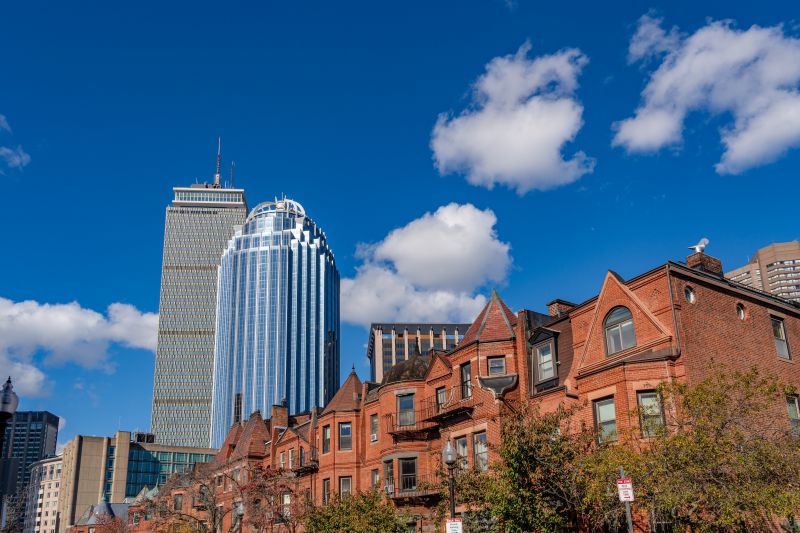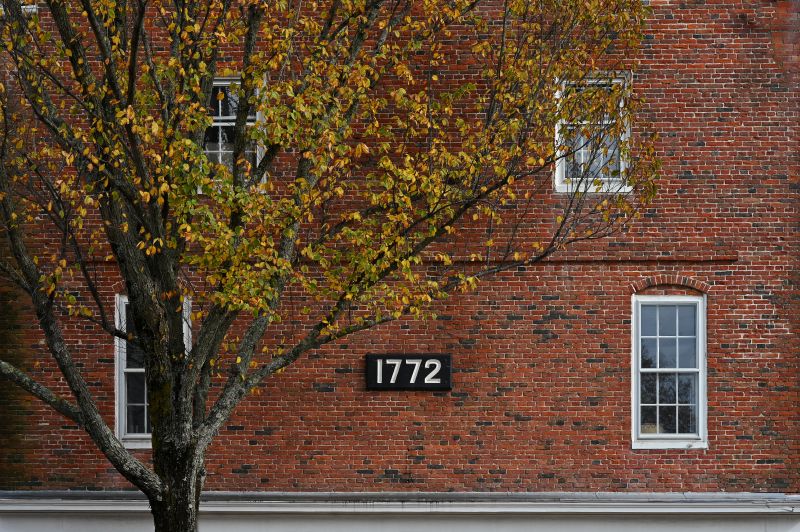
Over the past year, Boston’s apartment rental market showed some signs of coming back down to Earth. Following a two year period marked by historically low apartments availability and surging rent prices going back to the pandemic recovery, the city’s rental supply continued to loosen up throughout 2024. As a result, rent price growth decelerated, increasing by just +2.15% year-over-year compared to the +11.37% jump over the last 2 years.
Despite the small uptick in inventory, apartment supply levels remained below historical standards on account of high demand and lack of new supply hitting the market. These are the trends that moved Boston’s apartment rental market in 2024.
Boston’s Apartment Supply Still Tight, But Up Year-Over-Year
The current real-time availability rate (RTAR) for Boston apartments is 3.22%. That figure is up +17.95% year-over-year and up +50.47% compared to 2 years ago, when apartment availability was at a historical low in January 2022. RTAR peaked at 5.47% in late March last year, which was a +24.6% increase in the seasonal peak of 2023 (4.39%). In our 2024 mid-year Boston apartment rental market report, we predicted RTAR to settle around 2% during September and October, and we were close. Apartment availability hovered around the 1.8% mark throughout most of the fall months. Considering it was an election year and a wild ride all the way to November 4th; coupled with the stock market taking off like a rocket ship – I think we nailed it on our forecast.
The current real-time vacancy rate (RTVR) in Boston is 1.07%. That figure is up +37.18% year-over-year and up +98.15% over 2 years. In September of this year, Boston’s RTVR spiked well above the 1% mark for the first time since 2021. Seasonal vacancy peaked at 1.61% this year in September, which is still short of the 2-3% spike we typically saw in the years prior to the pandemic. Still, it was a step towards normalcy when compared to the previous 2 years, during which time vacancies remained far below historical norms. We are also starting to see a lot more luxury buildings asking to proactively advertise on Bostonpads.com itself which indicates that some luxury buildings are having a harder time getting to the coveted 95% occupancy mark.
While rental supply did increase slightly this year, overall demand remains strong for apartment rentals. According to our most recent Boston rental data, the median days on market for an apartment in Boston is 19 days, down from 34 days a year ago.
Average Rent Prices in Boston
The current average rent price in Boston is $3,282, which is up +2.15% year-over-year. Price growth did decelerate significantly, especially throughout the latter half of 2024. In our 2024 Boston Apartment Rental Market Forecast, we predicted price growth in the 4-6% range this year, which we undershot by a few percentage points. There has been a confluence of increases coming in various utilities which may be concerning landlords about their ability to raise rents. There are also slated increases coming in utilities in 2025 which will not be tenant friendly in the least.
Rent price growth for larger units outpaced those of smaller apartment sizes in 2024. The average rent price for studios, 1 bedrooms, and 2 bedrooms rose by +3.00%, +3.57%, and +2.51% respectively, and all of these have been trending flat or slightly down over the last 90 days. The average rent price for 4 bedroom and 5 bedroom apartments are up +6.23% and +5.44% respectively over the last 12 months. This shows that demand for larger apartments is outpacing that of smaller apartments, which makes sense considering the rent price growth we’ve seen over the past few years. This has effectively incentivized renters to seek out roommates and larger apartments in order to reduce housing costs by splitting rent and utilities. We fully expect this trend to continue especially as utility costs continue to rise.
| Apartment Size | 2025 Avg. Rent Price | 1-Year Change % | 2-Year Change % |
| Boston Studios | $2,272 | +3.00% | +13.81% |
| Boston 1BR Apartments | $2,667 | +3.57% | +13.15% |
| Boston 2BR Apartments | $3,285 | +2.51% | +13.33% |
| Boston 3BR Apartments | $3,898 | +2.89% | +13.87% |
| Boston 4BR Apartments | $4,820 | +6.23% | +16.64% |
| Boston 5BR Apartments | $6,082 | +5.44% | +19.13% |
Trends Affecting Boston’s Apartment Rental Market
Elimination of Renter-Paid Broker Fees
Governor Healey recently announced plans to eliminate renter-paid broker fees in the City of Boston. The debate picked up after NYC adopted similar legislation in December and it looks like Boston may follow suit. We want to state unequivocally that enacting such legislation will have an adverse impact on the rental market. It is a totally misguided and “bait and switch” distraction tactic to the real broader problem of housing affordability. Passing the broker fee on to the landlord will inevitably cause rent prices to increase as landlords will seek to offset this cost. If not, the quality of our rental supply will denigrate as property owners will have less revenue to invest back into their properties. Landlords in Boston are already facing a whole host of price increases due to the inflation that has spread throughout the entire economy. Forcing the landlords to pay the fee could also negatively impact real estate agents and cause a loss of jobs. This change could cause more people to leave our state and not spend money locally. Once agents lose jobs, it is quite logical to think that large national online real estate portals would most likely increase their advertising fees they place upon landlords. Therefore landlords and real estate agents would be harmed and less money would be spent locally in shops and services around Boston and would be diverted to other cities that have their national headquarters outside of MA.
The reason why Boston apartments are so expensive is due to the horrible lack of new construction. Passing expenses onto landlords will not address this overarching issue. It’s a super small band aid at best on a much more serious ailment. Until the City can incentivize new construction and make it easier for developers to create new housing stock, they will not be able offset the rising cost of housing in the city. The city also has to get serious about removing affordability requirements. The state of MA has erroneously kept moving the affordability requirements higher and higher and made it harder for developers to pencil deals. Construction costs has gone through the roof and the cost of borrowing and other factors makes affordability requirements cause housing starts to never actually begin. In other words, this affordability gimmick makes people feel good but actually stalls supply so it just causes prices to go higher. The city and state should strongly consider a three year moratorium on affordability requirements and I bet they would see a building boom that would ultimately bring more needed supply to drive down housing costs.
New Housing Permits Continue to Decline in Boston
In all of our rental market reports of the past 3 years, we stressed the importance of adding new housing inventory in Boston. That has not seemed to come to fruition so far, according to data from the Federal Reserve of St. Louis. New housing units have consistently declined over the past 4 years despite record low inventory and rising prices during that time span. So far, 2024 is on pace to have the lowest number of new construction units approved and issued in the last 6 years. Remind me what the definition of insanity is – doesn’t it go something like this “the definition of insanity is doing the same thing over and over and expecting a different result." It is time to make some serious zoning changes and get rid of affordability requirements for a few years so building gets going again.
This shortage in rental inventory has been the main driver of soaring rent prices in Boston over the past few years. You cannot stop the forces of supply and demand. When supply drops and demand stays the same or increases, prices will always rise. We have to put more macro and micro economics classes back into our school systems. We have to teach more classes about supply and demand.
Boston’s Population Reentering Growth Phase
Boston’s population has been back on the rise in recent years following a 3 year period where population stagnated from 2019-2022. In 2020, Boston saw the first decrease in population in decades as a result of strict COVID policies and remote work. As restrictions eased and workers returned to their offices, the population began trending back upwards.
According to data from Macrotrends, population growth in Boston will continue to move upwards over the next 5-10 years. This will put additional pressure on the already limited supply of housing in Boston. You will also see more development being pushed along the outer core of Boston.
Unemployment Rate Uptick in Boston
The City of Boston saw an increase in unemployment rate in 2024. The unemployment rate for Suffolk County, MA surpassed the 4% level for the first time since July 2022 when the local economy was recovering from the pandemic. The most recent figures for November 2024 show an unemployment rate of 3.9%, up from 3.1% in November 2023. The Boston Globe attributes this increase to an influx of new residents seeking employment and a slow-down in hiring.
Boston Continues to Attract Venture Capital
Boston continues to be a hot bed for attracting venture capital for startups, particularly in the biotech and medical fields. According to Pitchbook’s Q4 2024 Venture Monitor, Boston based startups raised a total of $4.1 billion in 2024 compared to $3.5 billion in 2023. Boston ranks #3 in the nation for attracting VC funding behind only San Francisco and New York City.

This influx of venture capital into the City continues to create high paying jobs in the medical and tech spaces, which attracts talent from all over the world to Boston. These new residents have and will continue to place additional demand for high quality housing in Boston, the supply of which is already strained.
Demand for Boston Real Estate Back On The Rise
The City of Boston saw an increase in total residential property sales in 2024 after sales declined in 2023 and 2022. Sales for Boston real estate were particularly high during Q4, after the Fed lowered interest rates in September, November and again in December. This has seemed to stoke demand as consumers foresee additional rate cuts in the future.
Total sales in Q4 were 1,131 in Boston, a 20.7% increase compared to the 937 real estate sales recorded in Q4 2023. The increase in demand pushed the 30 day median sales price back up to $918,186 after dropping to $801,899 in September. Look for home prices to continue to climb in 2025 as interest rates continue to fall and consumers reenter the market after waiting on the sidelines for the last few years.
Inflation Trending Back Upwards
Consumer price index (CPI) trended downwards through the first 3 quarters of 2024 as the Fed maintained their lending rate of 5.5 points. As lending rates dropped in Q4, we began to see inflation creep back. As of December, year-over-year CPI change sat at 2.9%, up from 2.4% in September raising concerns that the Fed may have dropped rates too early.
Inflation has profound effects on housing markets, from the purchasing power of Bostonians to the cost of creating new housing. Rising costs have certainly been a huge driver in the historic housing shortage that we’ve experienced in the last few years. Developers are borrowing at higher rates and the cost of construction materials have soared, making it nearly impossible for new construction projects to be profitable. While this has definitely left an indelible mark on the Boston housing market, there looks to be relief in our future.
2025 Boston Apartment Rental Market Predictions
Looking ahead to 2025, there is a lot of optimism among developers as the new administration assumes control. Nearly all developers in Boston are indicating that they expect better times are ahead in 2026. By unleashing the power of our domestic energy supply, we will definitely see inflation and the cost of new construction come down. Many of the developers that have been waiting on the sidelines will come back are start modeling out deals with lower energy and construction costs. The fumbles and follies of the last several years should course correct themselves with better energy and material costs coming. Unfortunately, the effects will not be seen for at least 12-18 months in the way of new housing stock. It took us a long time to get into that bad position – it is going to take some time to get the better supply times going again.
This means that the rental supply shortage will not be going away in 2025 and prices will likely continue to push slightly higher. Even though rent prices have flattened out through the second half of 2024, look for prices to increase 2-4% this year due to population growth and increased purchasing and spending power from consumers. When taxes and inflation decrease, the consumer has more spending and saving power – pent up sales and rental demand usually increase as well. People naturally feel they can spend and save more when taxes are decreased. Think about it – it’s not that hard – it’s not necessarily what you earn but what you KEEP.
It’s important to note that if Boston does prohibit landlords from charging broker fees to renters, the average rent price will undoubtedly jump by a higher margin. If landlords are forced to pay broker fees, they will have to offset that cost in the form of higher rent prices. Every survey and discussion we have conducted with landlords has indicated that most property owners do not have the time, expertise, nor want to show properties themselves and handle paperwork on their own. Real estate agents are a valuable tool in helping to keep overall rental prices lower because it keeps landlords from raising rents higher to offset new additional costs. If this legislation does get passed, we expect rent prices to jump somewhere in the 6-10% range when it goes into the next apartment leasing cycle. We will continue to monitor these trends right here on bostonpads.com.

Demetrios Salpoglou
Published January 27, 2025
Demetrios has pulled together the largest apartment leasing team in the Greater Boston Area and is responsible for procuring more apartment rentals than anyone in New England – with over 130k people finding their housing through his services. Demetrios is an avid real estate developer, peak performance trainer, educator, guest lecturer and motivational speaker.










